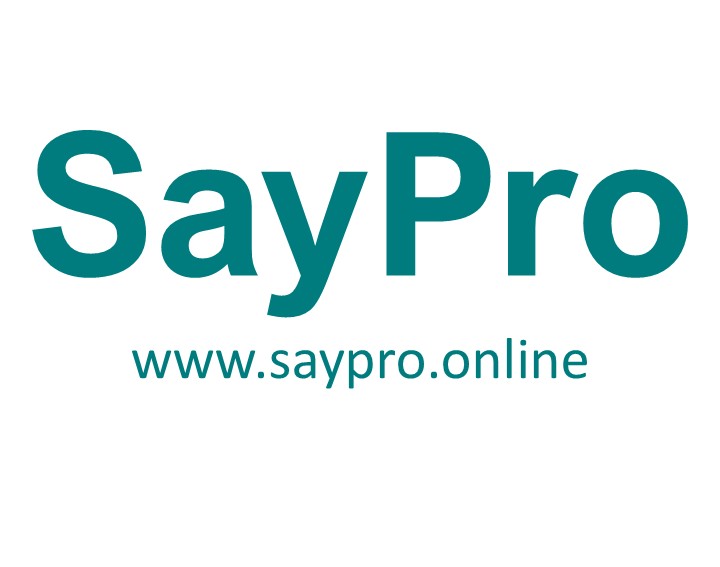SayPro Monthly January SCMR-5 SayPro Monthly Classified Support Tickets: Implement a support ticket system for user inquiries by SayPro Classified Office under SayPro Marketing Royalty SCMR
Overview: The implementation of a support ticket system for user inquiries as part of the SayPro Monthly January SCMR-5 under the SayPro Marketing Royalty SCMR is a critical task that requires a specific set of skills to ensure success. The skills needed range from strong communication and technical abilities to a deep understanding of customer service processes and effective use of support software.
1. Strong Communication Skills:
- Clear and Concise Instruction Delivery: The ability to explain complex technical processes in an easy-to-understand manner is crucial. When providing instructions on how to use the support ticket system, it is important to make sure that all team members, from technical staff to end-users, can easily follow and understand the instructions.
- Effective Written Communication: Written communication is essential, especially when creating FAQs, knowledge base articles, and troubleshooting guides for the support ticket system. This requires strong writing skills to break down the steps or solutions clearly and accurately.
- Active Listening: It is vital to listen carefully to user inquiries and issues to ensure that the support ticket system is addressing their needs. Feedback from users should be taken seriously, with a focus on identifying potential areas for improvement in the system.
2. Technical Skills for Support Ticket System Integration:
- Knowledge of Ticketing Software: Familiarity with various ticketing systems (e.g., Zendesk, Freshdesk, or a custom solution) is necessary. The person implementing the system should understand how to configure, customize, and troubleshoot the ticketing software to match the requirements of the SayPro Classified Office.
- System Integration: Implementing a support ticket system requires technical knowledge in integrating the software with existing systems. This may include customer relationship management (CRM) tools, email servers, or live chat systems. Integration ensures that tickets can be seamlessly managed and tracked across multiple platforms.
- Database Management: Understanding how to store, manage, and retrieve support ticket data securely is vital. This requires knowledge of database management systems, data privacy protocols, and ensuring the system is scalable to handle a growing number of support tickets.
3. Problem-Solving and Troubleshooting:
- Issue Identification and Resolution: The ability to identify and analyze technical issues, from broken ticket forms to delayed responses, is critical. Understanding the root causes of problems and efficiently implementing solutions will ensure a smooth support process.
- Adaptability to User Needs: The support ticket system should be adaptable to various user requirements, and the ability to modify or expand the system as necessary to accommodate new or evolving user needs is essential.
- System Optimization: Regularly reviewing and optimizing the ticketing system to improve response times, user satisfaction, and system efficiency is key to maintaining high levels of support.
4. Customer Service Knowledge:
- Understanding User Needs: A clear understanding of the types of inquiries users will make and their expectations is essential. The support ticket system should be designed with these needs in mind, ensuring that it is intuitive and user-friendly.
- Building Strong Relationships: The support system should not only solve user problems but also build long-term customer loyalty. Ensuring that all support agents are trained to use the system effectively and provide personalized service can go a long way in fostering positive customer experiences.
- Escalation Process Management: A clear and structured escalation process should be in place for issues that cannot be resolved at the first level. This requires knowledge of how to triage tickets, route them to appropriate specialists, and track their progress until resolution.
5. Project Management and Organization:
- Efficient Workflow Management: Implementing a support ticket system requires careful planning and organization. The person in charge must be able to define the project scope, set clear milestones, and keep track of progress. This involves managing both technical and operational tasks to ensure the system is set up within the required timeframe.
- Collaborative Skills: Since the project involves multiple departments (IT, support, marketing, etc.), the ability to collaborate and align efforts across teams is vital. Regular communication, updates, and coordination are necessary to keep the project on track and address any issues as they arise.
- Documentation: Creating comprehensive documentation for both internal teams and users will be necessary. This includes setup guides, troubleshooting documentation, and system usage policies. Proper documentation ensures that the support ticket system can be maintained efficiently and that new users or team members can quickly get up to speed.
6. Analytical Skills:
- Data Analysis: Analyzing the support ticket data is crucial for identifying patterns in user inquiries, common issues, or potential bottlenecks in the system. The ability to interpret this data will help in refining the support process, improving user satisfaction, and making data-driven decisions to enhance the overall support system.
- Performance Metrics Monitoring: Monitoring key performance indicators (KPIs) such as ticket resolution time, response time, and customer satisfaction will help evaluate the success of the system and identify areas that need attention.
7. Security and Privacy Awareness:
- Confidentiality and Data Protection: The person implementing the support ticket system must be knowledgeable about security protocols to protect users’ data and ensure compliance with relevant data privacy laws (such as GDPR). This includes securing user data, controlling access, and ensuring that the ticket system is protected against potential cyber threats.
- Secure Communication: Ensuring that the communication between users and support staff is secure is vital. This includes using encrypted emails, secure ticketing forms, and other measures to prevent unauthorized access.
Conclusion:
The implementation of a support ticket system for user inquiries under SayPro’s Monthly January SCMR-5 requires a comprehensive skill set encompassing strong communication, technical knowledge, customer service expertise, and project management capabilities. By combining these skills, SayPro can effectively manage user inquiries, improve customer satisfaction, and optimize the support process, all while ensuring a seamless integration of the system with the existing infrastructure.

